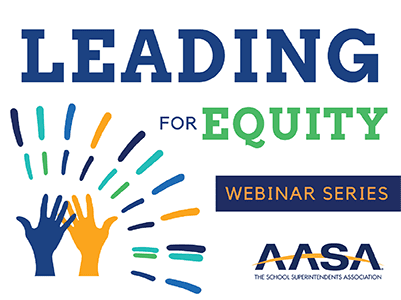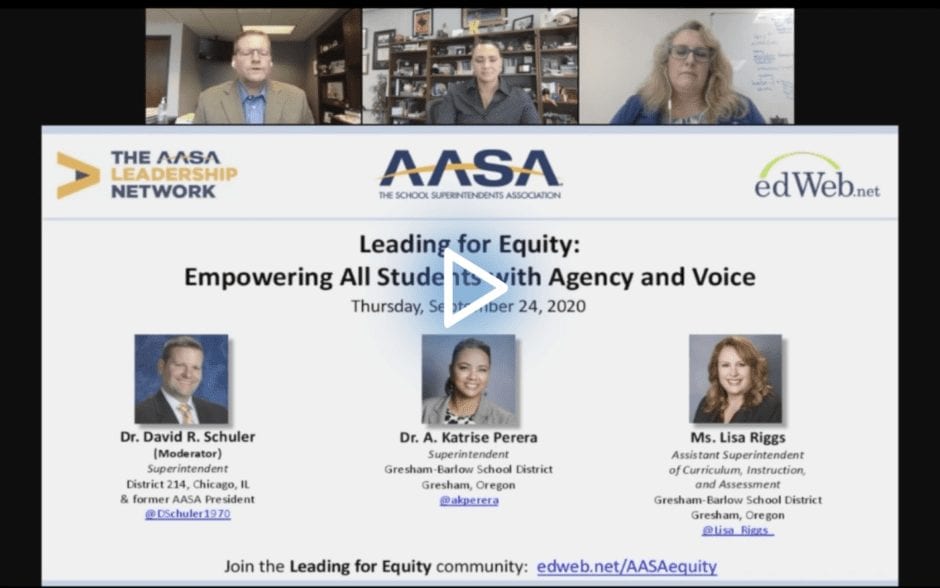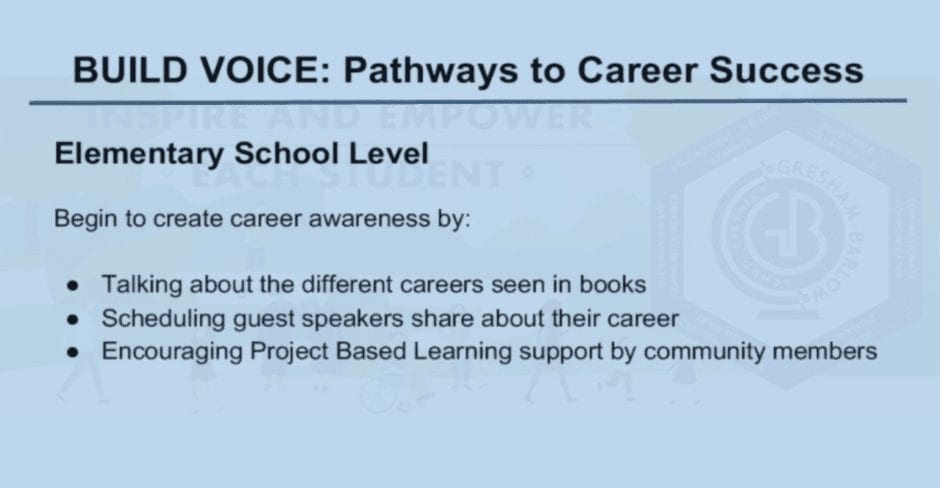Increasing Equity Through Student, Family, and Community Engagement
By Robert Low
Encouraging students, their families, and other community members to provide input and participate in school and district activities not only results in a more equitable education for diverse students, but also better prepares the students for college, careers, and responsible citizenship.
These and other important lessons from Oregon’s Gresham-Barlow School District were discussed during a recent edWebinar, hosted by AASA, The Superintendents Association and AASA’s Leadership Network, with the district’s Superintendent, Dr. Katrise Perera, and Assistant Superintendent of Curriculum, Instruction, and Assessment, Lisa Riggs. Gresham-Barlow’s school leaders explained how they have been able to increase and sustain engagement in district activities, and how this has led to improved outcomes for the students.
Located on the outskirts of Portland, the Gresham-Barlow district has 17 schools, including four charter schools, for its 12,000 students. Just over half of the students are White and about another quarter are Latino, with a total of almost 60 different languages spoken in the district.
The proximity to Portland has resulted in heightened awareness of the recent political protests and environmental problems in the area, and as with the COVID-19 pandemic, the district has responded by supporting student discussions about the issues and including the topics within the district’s curricular framework.
Engagement and Input Structures
Gresham-Barlow’s four-point learning model starts with accessible and intentional instruction that is designed to produce more equitable outcomes. Balanced assessments provide data used to differentiate teaching and learning, and there’s an emphasis on creating a safe educational environment that acknowledges the cultures and lived experiences of the students and their families.
Student, family, and community partnerships, another part of the district’s learning model, are encouraged and supported in a variety of ways. There are opportunities to provide input via equity-focused advisory committees at the school and district levels, and there are also student-led conferences in which students can share what has been working for them, what hasn’t, and where there have been improvements.
In addition, the district uses town halls, “empathy interviews,” equity audits, and school climate surveys to capture a wider range of input that can help district and school officials make informed decisions about the students’ education. This is especially important in a diverse district that includes Hispanics, Russian immigrants, and members of federally recognized Native American tribes.
Implementation and Participation
Encouraging and then responding to student input makes the school system more effective and has the added benefit of letting students know their voices are being heard and respected. This, in turn, can lead to greater engagement in the education process. There is also a deliberate effort to focus students on listening to the voices of other students, and knowing there is likely to be disagreement about certain topics, provide opportunities to engage in respectful and well-articulated discourse.
These sorts of discussions are part of a continuum of creative expression that includes writing, performances, and the use of social media. These discussions extend beyond the schools themselves to engagement with local community organizations and businesses, as part of the district’s effort to provide multiple pathways to success and ensure students are aware of them.
Learning about possible careers begins in kindergarten with discussions about jobs described in books and then continues with guest speakers who discuss their careers with the students. Project-based learning activities supported by community members are also an important part of this process, as is the district’s focus on preparing students for jobs that are expected to grow by 20 to 30% in the future, such as health care, engineering, and public services.
One specific implementation of this approach is the Tomorrow Bus, a mobile innovation lab that goes to district schools and provides a range of hands-on learning activities and supplemental instruction, with older students participating in the guidance and support of younger students. The Tomorrow Bus and its resources are designed to enhance awareness of career pathways, in combination with other educational efforts at the secondary level.
Middle school students fill out a self-assessment tool for college and careers, and then can see related videos, discuss needed skills, and build success indicators for their progress. At the high-school level, the district is providing more opportunities for students to obtain dual credits and work with community partners in order to increase students’ readiness for college, careers, or the military.
Through this combination of processes, students have access to a more equitable education and better opportunities after they graduate. They also develop critical thinking and listening skills, and an understanding of how to advocate for themselves as responsible members of a larger community.
This edWeb broadcast was hosted by AASA, The Superintendents Association and AASA’s Leadership Network, providing premier professional learning for educational leaders.
About the Presenters
In May of 2017, the Gresham-Barlow School Board selected Dr. A. Katrise Perera to serve as superintendent of schools beginning July 1, 2017. Dr. Perera is the former national director of urban markets division with McGraw Hill Education. Prior to her work with McGraw Hill, she served as superintendent of the Isle of Wight County Schools in Smithfield, Virginia for four years. During that time, she received the National Association of School Superintendents 2015 Superintendent of the Year Award. Dr. Perera’s extensive experience as an educator includes classroom teacher, middle school principal, and area/regional superintendent of the Houston Independent School District which serves more than 200,000 students.
Lisa Riggs serves as Gresham-Barlow’s assistant superintendent of curriculum, instruction, and assessment. Riggs previously served as associate superintendent/chief academic officer in the San Antonio Independent School District (SAISD). Riggs has a master’s of education in educational leadership from the University of Victoria, B.C., Canada. In addition, she earned a master’s of education in curriculum and instruction from Seattle City University. In her role as assistant superintendent, in conjunction with the district leadership team, Ms. Riggs is responsible for supporting building principals, instructional coaches, and the technology department staff.
About the Host
Dr. David R. Schuler is the 2018 Illinois and National Superintendent of the Year. Known for his ability to inspire and build leaders, he spearheaded Redefining Ready!, the national movement to redefine what it means for students to be college, career and life ready while serving as the 2015-2016 President of AASA, The School Superintendents Association.
Dr. Schuler has served 20 years as a superintendent, 15 of which currently leading High School District 214, Illinois’ largest high school district, where he led the development of an innovative instructional philosophy around personalized learning experiences focused on career pathways, early college credit, and industry credentials that enables students to discover their futures while still in high school. In addition, District 214 now teaches computer science to all 12,000 students, and its six schools were among only seven in the nation to pilot an iOS app development curriculum, initiatives which were recognized by the Obama White House.
Join the Community
Leading for Equity is a free professional learning community on edWeb.net for school and district leaders who face many challenges leading schools and driving school improvement for all students, especially now with COVID-19.
The AASA Leadership Network drives superintendent success, innovation and growth, shaping the future of public education while preparing students for what’s next. We are the largest, most diverse network of superintendents in America. Passionate and committed, we connect educational leaders to the professional learning, leadership development, relationships and partnerships they need to ensure a long career of impact.
Robert Low has more than 30 years of educational publishing experience, ranging from editing and product management to online advertising and content development. He also works with edWeb.net to write articles on their professional learning edWebinars.







Comments are closed.